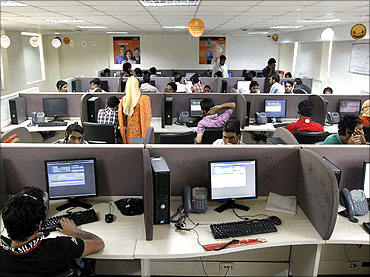 As the Internet penetration gains more strength, India is headed to be a huge force in shaping the digital future of the world, a top official of Mozilla Foundation, makers of Firefox webs browser has said.
As the Internet penetration gains more strength, India is headed to be a huge force in shaping the digital future of the world, a top official of Mozilla Foundation, makers of Firefox webs browser has said.
"India is a huge force, not only in terms of people coming online, but also shaping what the digital future can be.
As we figure out, how do people understand web, India absolutely has to be at the core of that," Mark Surman, executive director of the Mozilla Foundation told PTI in a recent interview.
As the web spreads to the whole of humanity, India and the talented code developers from India are going to play a key role in the global digital literacy.
As in the next decade some five to six billion people are expected to gain access to the web, Surman said it is important that everybody understands how web works.
"Web literacy is important," he noted. Having travelled to India several times, Surman is highly impressed by the talent of Indian techies.
"One of the things so excited about India is that people are so aspirational.
They are starting to say, how I can make life better? And Internet is a promise to that aspiration," he said. "When I come to India,
it is really exciting to see, especially those Mozilla volunteers, that aspiration and see unlock those things to people, and also they want to teach that to the other people across India," Surman said, adding that India is playing a key role in the recently launched global digital literacy programme of Mozilla.
Mozilla, he said, decided a few years ago that it is not just important to create open source product, that empower people to use the web, but also that everybody in the world understand what they can do on the web.
"Not just to be a consumer, but also to be a creator of the web," Surman said.
Early July, Mozilla launched a two-month global campaign of events known as "Maker Parties" aimed at promoting web literacy to all people.
This includes around 2,000 events in 350 cities worldwide in the coming two months and many of them are taking place in India, which Mozilla describes as a global Internet pioneer.
The Maker Party events give hands-on education to people in everything from learning to write html code and build websites to understanding how to protect data and privacy and how to move from being a consumer of the Internet to a producer.
The campaign also includes work on more general topics like gender equality, economic development, good governance – and how to make the web work better in the service of the goals people choose.
It is an utterly unique, ambitious worldwide push for web literacy and India is very much at the centre of it, Surman said.
Some of the important campaigns of this digital literacy campaign, he said, has being held in India, where people were creating new ways to teach.
One of the biggest of the maker parties this year is being held in Bangalore in India towards the end of the year, he said, adding that he is planning to attend this.
"This shows the leadership role of the Mozilla community in India," he said. Some of the best volunteers of the Mozilla community are from India, who, he said are strong in their skills.
The Makers Party, he asserted is about more than coding. "It is a great call to arms that puts the world’s users at the centre of the web.
Success in the 21st century depends on web literacy – and on making the web what we all want it to be," he said.











 © 2025
© 2025